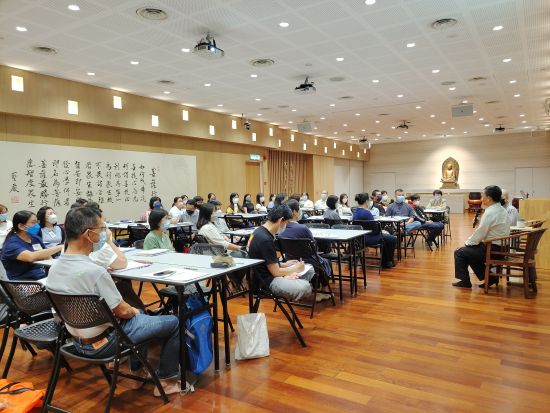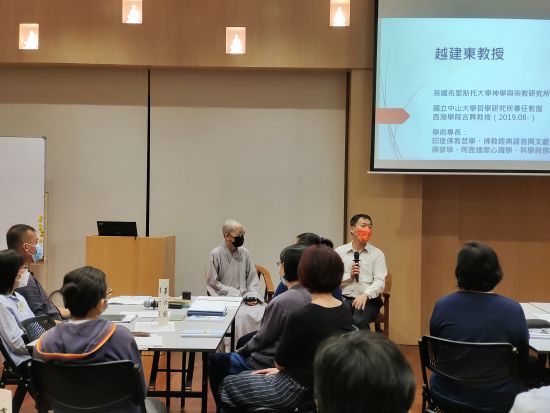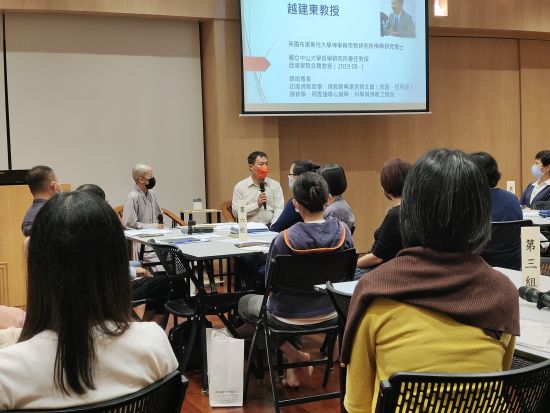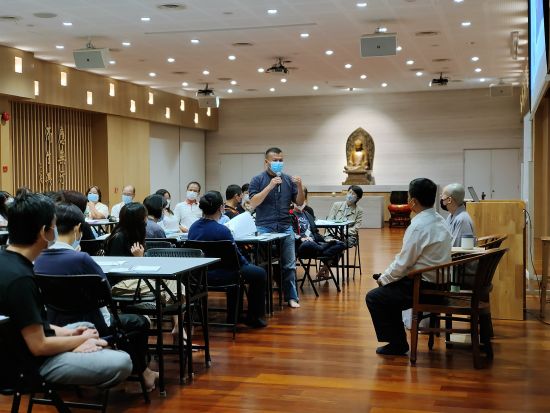DDM Global News
Following Master Sheng Yen's Path to Seek Buddhism and Self-Cultivation - Professor Kin-Tung Yit’s Sharing Session
 On the evening of March 2, the Dharma Study Class at the DDM Buddhist Centre Malaysia had the privilege of hosting Professor Kin-Tung Yit, who wrote the preface to Master Sheng Yen's "The Essentials of Buddhism," to share his experiences and insights on following Master Sheng Yen's path in Buddhism and self-cultivation. DDM Buddhist Centre Malaysia Director Ven. Chang Zao steered the conversation and asked questions on behalf of the audience.
On the evening of March 2, the Dharma Study Class at the DDM Buddhist Centre Malaysia had the privilege of hosting Professor Kin-Tung Yit, who wrote the preface to Master Sheng Yen's "The Essentials of Buddhism," to share his experiences and insights on following Master Sheng Yen's path in Buddhism and self-cultivation. DDM Buddhist Centre Malaysia Director Ven. Chang Zao steered the conversation and asked questions on behalf of the audience. During the talk, Professor Yit shared his humorous and witty anecdotes about his various interactions with DDM founder Master Sheng Yen, as well as his experiences and reflections in the Buddhist academic community. The conversation helped the attendees gain a more profound understanding of Shifu's compassionate vow to establish schools, the research he conducted on Buddhist teachings, and the future development of Buddhism. The discussion inspired the attendees on their path of self-cultivation.
During the talk, Professor Yit shared his humorous and witty anecdotes about his various interactions with DDM founder Master Sheng Yen, as well as his experiences and reflections in the Buddhist academic community. The conversation helped the attendees gain a more profound understanding of Shifu's compassionate vow to establish schools, the research he conducted on Buddhist teachings, and the future development of Buddhism. The discussion inspired the attendees on their path of self-cultivation.Professor Yit was born in Malaysia and came to Taiwan at the age of 19 to study in the Department of Physics at National Taiwan Normal University. While there, he joined the Buddhism Club and was introduced to Master Sheng Yen's College Youth Camp. The following year, he enrolled in the Chung-Hwa Institute of Buddhist Studies, becoming one of Shifu's students. During his academic career, Professor Yit participated in Master Sheng Yen's Seven-day Chan Meditation Retreat and officially became one of his disciples. "Master Sheng Yen used the methods in the Chan retreat to guide us. He used the 'carrot and stick' approach, and cared about both the details of our daily lives as well as the progress on our research and homework," Professor Yit recalled. While pursuing knowledge and education, Shifu emphasized that cultivating the aspiration for the Way should be the top priority, followed by physical health and academic studies.
 Professor Yit explained that he admired Master Sheng Yen's vision and foresight in running the Buddhist Institute, where he invited renowned scholars around the world to share and exchange ideas, thus connecting his students with the development of international Buddhist education. In doing so, he was able to establish a connection with the international Buddhist academic community in the future. Not only did Shifu cultivate many distinguished Buddhist research talents, but he also formed many virtuous connections for Dharma Drum Mountain. Ven. Chang Zao recalled how Shifu once remarked, "We should consider not just for the DDM Sangha and devotees, but also the whole world. Our target includes Buddhists and all sentient beings." It was because of Shifu's broad-mindedness that his impact is still great even after his passing away many years ago.
Professor Yit explained that he admired Master Sheng Yen's vision and foresight in running the Buddhist Institute, where he invited renowned scholars around the world to share and exchange ideas, thus connecting his students with the development of international Buddhist education. In doing so, he was able to establish a connection with the international Buddhist academic community in the future. Not only did Shifu cultivate many distinguished Buddhist research talents, but he also formed many virtuous connections for Dharma Drum Mountain. Ven. Chang Zao recalled how Shifu once remarked, "We should consider not just for the DDM Sangha and devotees, but also the whole world. Our target includes Buddhists and all sentient beings." It was because of Shifu's broad-mindedness that his impact is still great even after his passing away many years ago.Professor Yit explained that Dharma learning is a gradual process that starts with reading basic Buddhist scriptures, followed by intermediate Buddhist courses and advanced Buddhist research. Then, with the help of the Sangha's guidance, we can deepen our understanding and practice while experiencing the Buddhadharma. "Buddhists must put in a copious amount of time and energy to study the Buddhist texts. There are no shortcuts; however, once you find benefits in doing this, your life will be worthwhile.”
 Professor Yit, an expert in Chan meditation, proposed to the attendees, "In recent years, Chan meditation has created an important dialogue between science and Buddhism in the West. The study of Chan meditation includes the study of Buddhist scriptures, Buddhist teachings, and the system of self-cultivation." Professor Yit went on to expound on the importance of the study of Chan meditation. "Self-cultivation is to correct our own behaviors, cultivate a virtuous mind, and develop the mind of tranquility (Samatha) and insight meditation (Vipassana). It is not just about practicing sitting meditation techniques. We should uplift people's quality via self-cultivation and build a pure land in the world.”
Professor Yit, an expert in Chan meditation, proposed to the attendees, "In recent years, Chan meditation has created an important dialogue between science and Buddhism in the West. The study of Chan meditation includes the study of Buddhist scriptures, Buddhist teachings, and the system of self-cultivation." Professor Yit went on to expound on the importance of the study of Chan meditation. "Self-cultivation is to correct our own behaviors, cultivate a virtuous mind, and develop the mind of tranquility (Samatha) and insight meditation (Vipassana). It is not just about practicing sitting meditation techniques. We should uplift people's quality via self-cultivation and build a pure land in the world.”Furthermore, Professor Yit repeatedly emphasized that lay Buddhists should support the five masters, namely, Vinaya Masters, Dharma Masters, Sastra Masters, Chan Masters, and Sutra Masters. He also encouraged prominent youths to join the ranks of monastics and to receive the finest education. Ven. Chang Zao praised Professor Yit as a role model for lay Buddhists. She remarked, "In addition to caring about his field of expertise in the Buddhist academic field, he is also concerned about Buddhism and the Three Jewels." Ven. Chang Zao encouraged the attendees to associate themselves with virtuous friends, to be inspired and to receive guidance, learn buddhadharma to understand its true teachings, think in accordance with the Right View to deepen their understanding of buddhadharma, incorporate what they learned in Buddhism in their daily lives and, lastly, put the Buddhist teachings into practice.
Text: Luo Zhi-hao (羅志豪)
Photo: Ye Li-Qin (蔡麗芹)
Translated by: Ariel Shen (沈純湘)
Edited by: Keith Brown, James Hsu
